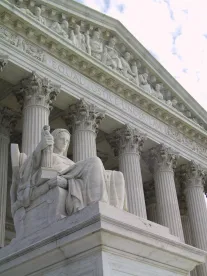The Supreme Court further limited consumer lawsuits in TransUnion, LLC v. Ramirez, siding with credit reporting agency TransUnion in a 5-4 decision holding that thousands of consumers improperly flagged as potential terrorists do not have standing to sue the company for damages. TransUnion expands upon Spokeo, Inc. v. Robins, 2578 U.S. 330, 340 (2016) in limiting standing under the Fair Credit Reporting Act (FCRA) and Article III to plaintiffs who have suffered concrete harm, not just the violation of a statutory right. As a practical matter, TransUnion significantly narrows plaintiffs’ ability to assert claims in federal court on behalf of broad classes without proving a concrete injury to each member.
Class representative Sergio Ramirez sued TransUnion under the FCRA for falsely flagging him as a part of a list of terrorists, drug traffickers, and other serious criminals issued by the Treasury Department’s Office of Foreign Assets Control (OFAC). Ramirez learned TransUnion had flagged him as a part of the OFAC list when he was denied credit in applying for a car loan. The district court certified a class of 8,185 individuals whose credit files also contained misleading OFAC alerts. Of the 8,185 class members, 1,853 class members, like Ramirez, had their credit reports disseminated to third parties, while the credit files of the remaining 6,332 class members were never disclosed to third parties. A jury awarded the class more than $60 million in damages. The 9th U.S. Circuit Court of Appeals upheld the District Court’s award of statutory damages but reduced the amount of punitive damages.
In an opinion authored by Justice Brett Kavanaugh, the Supreme Court reversed the 9th Circuit’s decision. The 5-justice majority found that, while 1,853 class members who had their credit reports disclosed to third parties suffered concrete harm, the remaining class members who did not have their credit reports provided to a third party suffered no concrete harm or harm that was too speculative to support standing. An injury is “concrete” only if it is closely related to “a harm traditionally recognized as providing a basis for a lawsuit in American courts[.]” The Court found that, for Ramirez and the subset of 1,853 class members, their reputational harm from the false OFAC flag was closely related to defamation. But the remaining 6,332 class members did not suffer harm traditionally recognized as providing a basis for suit. Justice Kavanaugh wrote that these class members’ “harm is roughly the same, legally speaking as if someone wrote a defamatory letter and then stored it in her desk drawer. A letter that is not sent does not harm anyone, no matter how insulting the letter is. So too here.”
The decision may have the largest impact in the context of class action litigation. As the majority made clear, “[e]very class member must have Article III standing in order to recover individual damages.” In cases where injuries are not easily quantified or are based purely on statutory violations, plaintiffs’ lawyers may have a harder time certifying a class or may be forced to narrow the class definition to encompass only class members who have a present, “concrete” injury.
The Court’s decision may impact where plaintiffs decide to bring suit, as Justice Clarence Thomas suggested in a footnote in his dissent. State courts, which are not bound by federal rules of justiciability even when they address issues of federal law, maybe a more appealing forum for class actions based on federal statutory violations where concurrent jurisdiction applies. Whether this will ultimately result in more class-action lawsuits being brought in state instead of federal court remains to be seen.




 />i
/>i

